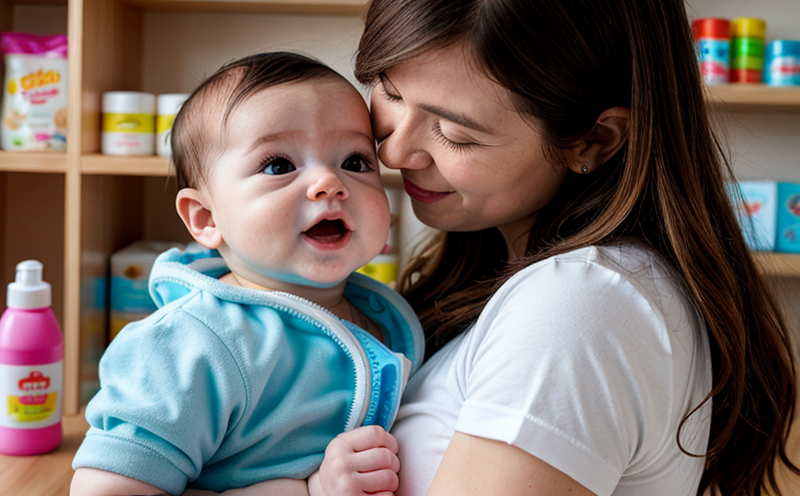Pilling Resistance Testing in Baby Blankets
The pilling resistance of baby blankets is a critical quality assurance parameter that ensures infant comfort and safety. Pilling refers to the formation of small, fuzzy fibers on textile surfaces over time due to friction. This phenomenon can lead to discomfort for babies who may inadvertently ingest these tiny fibers or feel irritation from rough textures against their sensitive skin.
The testing method used for pilling resistance is standardized internationally by ISO (International Organization for Standardization). According to ISO 12947-2, the test involves subjecting a sample of fabric to repeated friction cycles using a specified instrument. The number and size of pills formed are then quantified visually or by other means.
Pilling can occur in various stages: initial pilling, maturing phase, and eventually stabilization as the fabric reaches equilibrium. Testing is conducted on samples that have been prepared according to specific guidelines set forth by the standard. Specimens must be cut from the blanket at a specified area and orientation to ensure uniformity.
The apparatus used for this testing includes a pilling tester or similar device designed to replicate real-world conditions of friction between fabrics. The test involves placing the sample under controlled conditions, often using a rotating drum with abrasive material inside. The drum rotates through predefined cycles, simulating continuous use over time.
After undergoing the prescribed number of friction cycles, the sample is visually inspected for changes in appearance. The tester records the formation and growth of pills on the fabric surface. This data helps determine the fabric's resistance to pilling under typical usage conditions. Compliance with regulatory standards such as ASTM F1530 ensures that baby blankets meet safety requirements.
The importance of pilling resistance testing cannot be overstated, especially for products intended for infants and young children. Pilling can affect the aesthetic appeal of textiles but also poses a significant risk to infant health. Regular testing helps manufacturers identify potential issues early in the production process, allowing them to implement corrective measures before products reach the market.
By adhering to rigorous standards like ISO 12947-2 and ASTM F1530, companies can ensure that their baby blankets not only meet aesthetic expectations but also provide a safe environment for infants. This testing process is an integral part of quality control in the consumer products sector, particularly for textiles used in direct contact with skin.
- Customer Impact and Satisfaction: Ensuring high pilling resistance contributes to customer satisfaction by providing durable, comfortable blankets that maintain their appearance longer. Parents appreciate knowing they have chosen a product that is safe and suitable for their babies' needs.
In summary, pilling resistance testing plays a crucial role in maintaining the quality and safety of baby blankets. By addressing this aspect during development and production processes, manufacturers can enhance both the functionality and reputation of their products within the consumer market.
Eurolab Advantages
At Eurolab, we pride ourselves on offering comprehensive testing services that cater to the unique needs of the consumer products sector. Our expertise in baby blankets pilling resistance testing ensures accuracy and reliability, making us a trusted partner for quality assurance.
Comprehensive Testing Capabilities: We utilize state-of-the-art equipment and adhere strictly to international standards such as ISO 12947-2 and ASTM F1530. Our laboratory is equipped with the latest testing machines, ensuring consistent and accurate results every time.
Dedicated Technicians: Our team comprises highly skilled professionals who are trained in the latest techniques and methodologies to perform pilling resistance tests effectively. Their experience ensures that each test is conducted with precision and care.
Compliance Assurance: Eurolab's commitment to compliance means we can help manufacturers meet all relevant regulatory requirements, including those set by EU directives and international standards. This support simplifies the process for companies looking to ensure their products are safe and suitable for use in Europe and beyond.
Speedy Turnaround Times: Recognizing that timely delivery of test results is essential for maintaining production schedules, Eurolab offers quick turnaround times without compromising on quality. This agility allows our clients to make informed decisions promptly.
Cost-Effective Solutions: While maintaining the highest standards of accuracy and reliability, we strive to offer competitive pricing that aligns with our customers' budgets. Our cost-effective solutions ensure that businesses can afford high-quality testing services without sacrificing quality.
Environmental and Sustainability Contributions
In addition to ensuring the quality and safety of baby blankets, pilling resistance testing also plays an important role in promoting environmental sustainability. By identifying and addressing issues early on, manufacturers can reduce waste associated with product recalls or replacements due to poor durability.
The durability and longevity of baby blankets contribute positively to resource conservation efforts. Products that last longer require fewer resources throughout their lifecycle, from raw material extraction through manufacturing, distribution, and ultimately disposal. This extended lifespan reduces the environmental footprint associated with frequent repurchasing of less durable products.
Furthermore, pilling resistance testing supports the development of more sustainable materials and manufacturing processes. As manufacturers strive to meet both quality expectations and environmental goals, they are motivated to explore innovative approaches that enhance fabric performance while minimizing ecological impact.
Through rigorous testing and continuous improvement, Eurolab contributes to these broader sustainability efforts by offering reliable data that guides responsible business practices within the consumer products sector.





